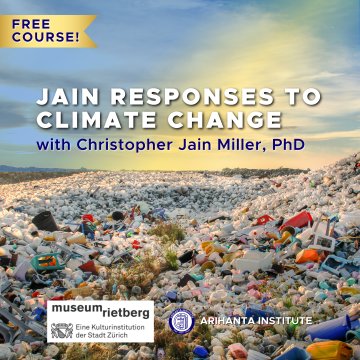Jain Responses to Climate Change
Course Intro Video


Jain Responses to Climate Change
Course 1008
Arihanta Institute is offering this open access course in collaboration with Museum Rietberg, coinciding with their Exhibition “Being Jain: Art and Culture of an Indian Religion” in Zurich, Switzerland.
Climate change is arguably the biggest collective challenge human society has ever encountered. But there is hope. Among many of the innovative solutions that have and continue to be proposed, the Jain tradition encourages an environmentally sustainable lifestyle, which, if incorporated into our daily lives worldwide, could have a significant impact in reducing the worst of the climate disaster that is yet to come. Learn the Jain way of life in conversation with some of climate change’s most pressing issues. Leave transformed and empowered to reduce your climate footprint.
Class 1
Jainism and Ecology: Recognizing the Interconnected Web of Life
Learn how the Jain tradition views the world as an interconnected web of life in which nothing wants to experience pain. Understand how the Jain principle of ahiṃsā, or non-violence, arises from this worldview and some of the fundamental ways you can reduce your carbon footprint by following the Jain way of life and in accordance with climate science.
Class 2
Jain Approaches to Food: Climate Change & Animal Agriculture
The IPCC (Intergovernmental Panel on Climate Change) recently advised that in light of the effects of animal agriculture on the climate, the entire planet must be “veganised.” Learn, in light of climate science, why animal agriculture is one of the most significant contributors to climate change and environmental degradation. Also study Jain approaches to an ethical and environmentally friendly diet that call into question our unnecessary reliance on animals for food.
Class 3
Jain Views on Consumption and Waste: A Changing Climate requires Changing Habits
Humans consume food, electronics, fuel and other commodities at rates far beyond what our planet can sustain in the long run and which amount to significant amounts of environmental degradation. Discover what the acceptable limits of consumption are, and also consider Jain ethical approaches to the human behavior of consumption. Be inspired to reconsider your own consumptive habits.
Class 4
Jain Professional Ethics: Making a Climate-Friendly Living
We all need to make a living, but what would it mean to make a “climate-friendly” living? Learn Jain ethical approaches to career and professional life, and understand the important connections between the work that you do and its potential effects on the climate. Be inspired to make a righteous living that is good for both you and our climate future.
Climate change is arguably the biggest collective challenge human society has ever encountered. But there is hope. Among many of the innovative solutions that have and continue to be proposed, the Jain tradition encourages an environmentally sustainable lifestyle, which, if incorporated into our daily lives worldwide, could have a significant impact in reducing the worst of the climate disaster that is yet to come. Learn the Jain way of life in conversation with some of climate change’s most pressing issues. Leave transformed and empowered to reduce your climate footprint.
Class 1
Jainism and Ecology: Recognizing the Interconnected Web of Life
Learn how the Jain tradition views the world as an interconnected web of life in which nothing wants to experience pain. Understand how the Jain principle of ahiṃsā, or non-violence, arises from this worldview and some of the fundamental ways you can reduce your carbon footprint by following the Jain way of life and in accordance with climate science.
Class 2
Jain Approaches to Food: Climate Change & Animal Agriculture
The IPCC (Intergovernmental Panel on Climate Change) recently advised that in light of the effects of animal agriculture on the climate, the entire planet must be “veganised.” Learn, in light of climate science, why animal agriculture is one of the most significant contributors to climate change and environmental degradation. Also study Jain approaches to an ethical and environmentally friendly diet that call into question our unnecessary reliance on animals for food.
Class 3
Jain Views on Consumption and Waste: A Changing Climate requires Changing Habits
Humans consume food, electronics, fuel and other commodities at rates far beyond what our planet can sustain in the long run and which amount to significant amounts of environmental degradation. Discover what the acceptable limits of consumption are, and also consider Jain ethical approaches to the human behavior of consumption. Be inspired to reconsider your own consumptive habits.
Class 4
Jain Professional Ethics: Making a Climate-Friendly Living
We all need to make a living, but what would it mean to make a “climate-friendly” living? Learn Jain ethical approaches to career and professional life, and understand the important connections between the work that you do and its potential effects on the climate. Be inspired to make a righteous living that is good for both you and our climate future.
Course Length
4 HoursCourse Details
This open-access course provides free, unlimited access to all learning materials.Learning Area
 Climate Change & Environment
Climate Change & Environment Instructor
 Christopher Miller, PhD
Christopher Miller, PhD
Christopher Jain Miller, the co-founder and Vice President of Academic Affairs at Arihanta Institute, completed his PhD in the Study of Religion at the University of California, Davis. He is Professor of Jain and Yoga Studies at Arihanta Institute, Visiting Researcher at the University of Zürich's Asien-Orient-Institut, and Adjunct Professor at Claremont School of Theology. Christopher's primary fields of research interest are Yoga Studies and Engaged Jain Studies, and he currently serves as the co-chair of the Yoga in Theory and Practice Unit at the American Academy of Religion as well as on the steering committees for the Dharma Academy of North America (DANAM) and the Yoga Darśana Yoga Sādhana conference. Christopher is the author of Embodying Transnational Yoga: Eating, Singing, and Breathing in Transformation (Routledge 2024) and the co-editor of Engaged Jainism: Critical and Constructive Studies of Jain Social Engagement (SUNY 2025) as well as Beacons of Dharma: Spiritual Exemplars for the Modern Age (Lexington 2020).
Enrollment Options
14-DAY FREE TRIAL
- Free, unlimited access to our self-paced courses for 14-days.
- Already used your free trial? Enroll in our Monthly or Annual Membership options at anytime and continue learning immediately!
MONTHLY MEMBERSHIP
- $45 USD / Month
-
Immediate access to course
#### | Name. - Unlimited access to our live and self-paced courses for one month, with month-to-month auto rollover.
- Excludes graduate seminars, language courses, and courses hosted on partner platforms.

